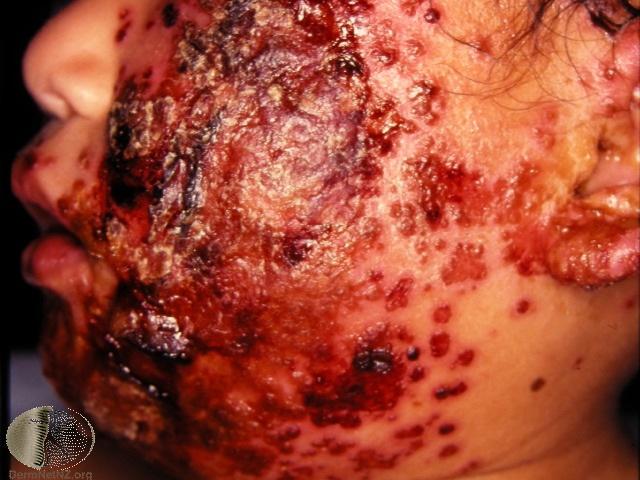Eczema Herpeticum
What is eczema herpeticum?

Eczema herpeticum appears more commonly on children with atopic dermatitis. Image courtesy of DermNet New Zealand
Eczema herpeticum is an infection usually caused by the herpes simplex 1 virus or “oral herpes” – the virus that causes cold sores to appear around and inside the mouth. These cold sores can appear on other places on the body, also.
Eczema herpeticum affects people with atopic dermatitis and other inflammatory skin diseases. The eczema herpeticum infection can be very serious, especially when it spreads over wide areas of skin.
Causes of eczema herpeticum
An eczema herpeticum happens when the herpes virus infects large areas of the skin. People with atopic dermatitis are more susceptible to skin infection in general, including eczema herpeticum. Eczema herpeticum can also appear in people who have contact dermatitis or seborrheic dermatitis. It is more common in infants and young children and those with severe atopic dermatitis.
The herpes simplex 1 virus is spread through skin-to-skin contact.
Symptoms of eczema herpeticum

Symptoms of eczema herpeticum include red, fluid-filled blisters on the face and neck. Image courtesy of DermNet New Zealand
Eczema herpeticum usually appears on the face and neck. It can also appear on other places on the body such as the hands. It can take up to two weeks for symptoms to appear after the first contact with the herpes simplex virus.
Skin symptoms of eczema herpeticum include:
- Cluster of small blisters that are itchy and painful
- Blisters that look red, purple or black
- Blisters that ooze pus when broken open
Other symptoms of eczema herpeticum include:
- High fever and chills
- Swollen lymph glands
- Not feeling well overall
If you suspect you may have eczema herpeticum it is very important that you see a doctor immediately.
How is eczema herpeticum diagnosed?
Because eczema herpeticum is potentially very serious, it is important to see your health care provider if you experience symptoms. A provider typically can diagnose the condition by appearance but they may also take a culture from the infected area of skin to confirm that it is eczema herpeticum.
Treatment for eczema herpeticum
Eczema herpeticum is treated with antiviral medications. If a secondary bacterial infection exists with eczema herpeticum, your doctor may also prescribe antibiotics.
Prevention

Eczema herpeticum may also appear on the hands and other parts of the body. Image courtesy of DermNet New Zealand
People with atopic dermatitis, contact dermatitis and other types of eczema should avoid contact with anyone who has a cold sore. This includes not sharing silverware, lipstick, glassware, or any other item that has touched the mouth of someone who has the herpes virus.
Complications of eczema herpeticum
Eczema herpeticum is potentially a very serious condition. Complications of this infection may include:
- Scarring from blisters
- Infection in the cornea of the eye known as herpetic keratitis, which left untreated, can lead to blindness
- In rare cases, organ failure and death if the virus spreads to the brain, lungs and liver
Immediate treatment for eczema herpeticum can reduce the risk of complications from the virus.

